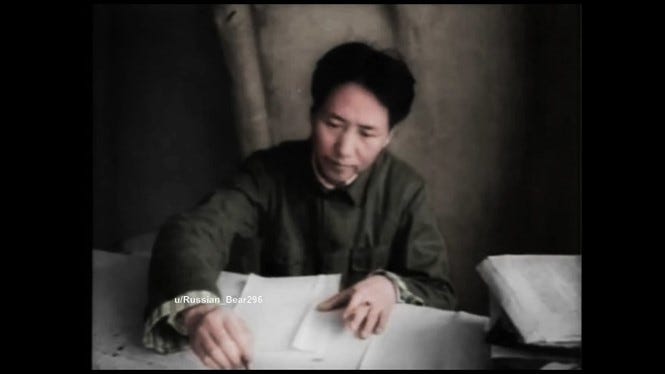Breaking Through the First ‘Encirclement’ [Spring 1931]
[a tsu, to the melody The Proud Fisherman, Yuchia Ao]
[translated by Nancy Lin]
Trees of tumultuous red singe the frosty sky
As wrath of the titans mount to heaven.
Fog thickens over Lungkang,
Thousands of craggy cliffs soon darken.
All at once, the cheers arise:
Vile Chang Hui-tsan is captured alive!
Then, blasts of reeking smoke from mid-air:
Back to Kiangsi, a horde of two hundred thousand.
Roused and rallied,
Workers and peasants, tens of millions,
Unite in one cause, one mind.
O, the restless red flags below Puchou Mountain!
Notes [by Nancy Lin]
Puchou Mountain is taken from the ancient legends about Kung-kung butting Puchou Mountain during his fight against the dynasty of Chuanshu. In using Puchou Mountain to symbolize the seat of Red power, the poet made a special observation as follows:
“Stories differ. I’m in favor of the version in Astronomical Notes, Huainantsu, which represents Kung-kung as the conquering hero. See what it says: ‘In his wrath, Kung-kung butted Puchou Mountain, breaking the pillars of heaven and snapping the moorings of earth. Thereupon, the sky tilted to the northwest and with it, the sun, moon, and the stars; the earth gaped in the southwest, where mire and water gathered.’ Apparently Kung-kung didn’t die, he triumphed.”
Incidentally, it may be noted, Kung-kung in Chinese means concerted labor.
Toward the end of 1930, Chiang Kai-shek launched the first ‘encirclement’ campaign against the Central Red Area in Kiangsi with a force of 100,000 men. The decisive battle took place near Lungkang (a town about mid-way between Kwangchang and Chi-an) on the foggy morning of December 30, resulting in a rout of Chiang’s troops and the capture of Chang Hui-tsan, their chief field commander.
In spring 1931, Chiang sent his chief lieutenant Ho Ying-chin to Nanchang with a force of 200,000 and began busily preparing for the second ‘encirclement’. The present poem was written in summer, the first stanza dealing with the battle at Lungkang, the second with the preparations for the second contest.
[next - 10. Breaking through the Second ‘Encirclement’]



